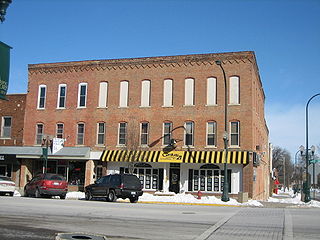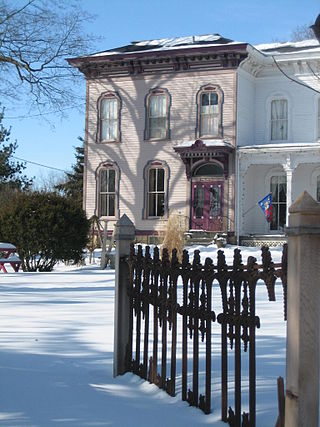
Sycamore is a city in DeKalb County, Illinois, United States. It has a commercial district based and centered on Illinois Route 64. The population was 18,577 at the 2020 census, up from 17,519 at the 2010 census. Sycamore is the county seat of DeKalb County and was named after the sycamore tree.

Gratz Park is a neighborhood and historic district located just north of downtown Lexington, Kentucky. It was named after early Lexington businessman Benjamin Gratz whose home stands on the corner of Mill and New streets at the edge of Gratz Park. The Gratz Park Historic District consists of 16 contributing buildings including the Hunt-Morgan House, the Bodley-Bullock House, the original Carnegie Library in Lexington, and several other private residences. Gratz Park occupies a tract of land that was established in 1781 outside the original boundaries of Lexington.

The Sycamore Historic District is a meandering area encompassing 99 acres (400,000 m2) of the land in and around the downtown of the DeKalb County, Illinois county seat, Sycamore. The area includes historic buildings and a number of historical and Victorian homes. Some significant structures are among those located within the Historic District including the DeKalb County Courthouse and the Sycamore Public Library. The district has been listed on the National Register of Historic Places since May 2, 1978.

The DeKalb County Courthouse is located in the county seat of DeKalb County, Illinois, U.S., the city of Sycamore. The Classical Revival structure sits on a square facing Illinois Route 64 as it passes through the city. The current courthouse was constructed in 1905 amid controversy over where the courthouse and thus, ultimately, the county seat would be located. The current building is the third structure to bear the name "DeKalb County Courthouse." DeKalb County's Courthouse still serves as the county's primary judicial center and is a contributing property to the Sycamore Historic District. The district joined the National Register of Historic Places in 1978. As the county's primary courthouse for over 100 years, the site has been host to many trials, including prominent murder cases.

The David Syme House is located in Sycamore, Illinois and is part of the Sycamore Historic District. The district was listed on the National Register of Historic Places in May 1978. The Queen Anne style home was constructed circa 1880.

The Frederick Townsend Garage is located in Sycamore, Illinois and is listed on the National Register of Historic Places as part of the Sycamore Historic District. It sits at the base of a small incline overlooked by the large Queen Anne style Townsend House. First a gas station, the building has been used by a number of restaurants since then. It was restored and remodeled for use as a community bank in 2016. The Sycamore Historic District was listed on the Register in May 1978.

The George's Block, once known as the James Block, is a 19th-century structure located in Sycamore, Illinois, along Illinois Route 64 as it passes through the DeKalb County seat. The Block is part of the Sycamore Historic District and as such is listed on the National Register of Historic Places. The district joined the Register in May 1978. The building dates from 1857 when it was owned by Daniel P. James but by the 1860s the building has become known as George's Block.

The Civil War Memorial, in the DeKalb County county seat of Sycamore, Illinois, United States, is located in front of the DeKalb County Courthouse on a public square. The memorial was erected in 1896 and dedicated in 1897. The structure is a memorial to the thousands of DeKalb County residents who served in the American Civil War. It incorporates an obelisk which rises to 50 feet in height. The base is adorned with copper sculpture, completed by an unknown sculptor. On the east facade of the memorial the word "Antietam", denoting the Battle of Antietam, is misspelled. This work of public art underwent its first restoration work in 2005-2006.

Old Sycamore Hospital is two-story brick structure in downtown Sycamore, Illinois, United States. It is a contributing structure within the Sycamore Historic District. The district was established when it was added to the National Register of Historic Places in 1978. The hospital building is located at the corner of Elm and Somonauk Streets in Sycamore.

The Charles O. Boynton Carriage House is a prominent structure in the Sycamore Historic District, located in Sycamore, Illinois. The Sycamore Historic District was added to the National Register of Historic Places in 1978. The Carriage House is considered one of more than 150 contributing properties to the overall historic integrity of the district.

The houses in the Sycamore Historic District, in Sycamore, Illinois, United States, cross a variety of architectural styles and span from the 1830s to the early 20th century. There are 187 contributing properties within the historic district, 75% of the districts buildings. Many of the homes are associated with early Sycamore residents, usually prominent business leaders or politicians. Houses within the district are known by, either their street address or by a name associated with a prominent owner or builder. For most of the houses, the latter is true.

As of 2007 there are five church buildings in the Sycamore Historic District, located in Sycamore, Illinois, United States which are listed as contributing properties to the district. The Sycamore Historic District was added to the U.S. National Register of Historic Places on May 2, 1978. When it was nominated to join the National Register there were seven church buildings within the district. One of those included is a residential structure that was utilized as a church when it was first constructed; the Arthur Stark House was once home to the Sycamore Universalist Church congregation. In the time since its listing, two churches have been destroyed or demolished. The Evangelical Lutheran Church of St. John was destroyed by fire in 2004 and the United Methodist Church in Sycamore is no longer extant, replaced by a modern office building.

The commercial buildings in the Sycamore Historic District, located in Sycamore, Illinois, United States are mostly located in and around the city's downtown. The largest concentration of commercial contributing properties to the historic district are found along Illinois Route 64 as it passes through Sycamore. They include several buildings known as "blocks" which can consist of more than one adjacent and attached structure, as is the case with the Waterman Block, one of the Sycamore commercial buildings.

The Carnegie Art Museum is a public art museum owned by the City of Oxnard, California in the building originally occupied by the Oxnard Public Library. The Neo-Classical building, located adjacent to Oxnard's Plaza Park, opened in 1907 as the Oxnard Public Library and was converted into an art museum in 1986. In July 1971, it became the first building in Ventura County and the first Carnegie library in California to be listed on the National Register of Historic Places.

Sunflower is a region of Maricopa County, Arizona, United States adjacent to the Mazatzal Wilderness, west of Tonto National Forest and northwest of Roosevelt Reservoir. Formerly a mercury-mining district, Sunflower is now a destination for hikers, campers and off-road vehicle tours. Sunflower is located near Arizona State Route 87, 22.8 miles (36.7 km) northeast of Fountain Hills. Route 87 near Sunflower is called the Beeline Highway.

The Public Library of Enid and Garfield County, founded in 1899, is a public library located in Enid, Oklahoma, the county seat of Garfield County, Oklahoma.

The Johnstown Flood Museum is a history museum located in Johnstown, Pennsylvania, dedicated to the Johnstown Flood of 1889. The museum is housed in the former Cambria Public Library, which is part of the Downtown Johnstown Historic District.

The Everett Carnegie Library is a Carnegie library building located in Everett, Washington, USA listed on the National Register of Historic Places and part of the Snohomish County Government campus. The building occupies the southeast corner of the intersection of Oakes Avenue and Wall Street in the city's central business district.

The Bozeman Carnegie Library in Bozeman, Montana was built in 1903–1904 with funding from Andrew Carnegie. City librarian Bell Chrisman led the effort to convince the city to seek Carnegie funds. It is one of 17 libraries in Montana and 1,679 in the United States funded by Carnegie. It was built on a Greek Cross plan in Classical Revival style, with Roman Doric columns supporting a triangular pediment at its entrance. The library was listed on the National Register of Historic Places on February 2, 1979. Today, the building houses the law offices of Cok Kinzler, PLLP.


















